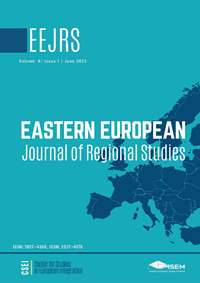HARNESSING ON THE POTENTIAL OF MIGRANTS IN THE SOCIO-ECONOMIC DEVELOPMENT OF THE REPUBLIC OF MOLDOVA
HARNESSING ON THE POTENTIAL OF MIGRANTS IN THE SOCIO-ECONOMIC DEVELOPMENT OF THE REPUBLIC OF MOLDOVA
Author(s): Mihai HachiSubject(s): Social development, Economic development, Migration Studies, Socio-Economic Research
Published by: Center for Studies in European Integration, Academy of Economic Studies of Moldova
Keywords: return migration; development potential of migrants; integration of migrants; PARE 1+1; PARE 1+2; migrant entrepreneurs;
Summary/Abstract: Migration is an important component of the development of the Republic of Moldova at the current stage. The economic and social instability that followed after obtaining political independence in 1991, the inefficiency of reforms in several socio-economic fields, the institutional uncertainty led the population to migrate, this being a strategy to adapt it to the created conjuncture situation. The increase in intensity migration was also influenced by the processes of liberalization of entry and exit procedures from the territory of the Republic of Moldova. Currently, our country represents one of the countries in the world with the largest shares of the migrant working population, as well as the share of remittances in GDP, the effects of migration being felt in all areas of social-economic life in the country. Concern for the support of migrants over time has materialized through the creation of governmental structures with the aim of monitoring and launching various strategies, programs, projects addressed to citizens outside the country's borders. Ensuring the reintegration of returned migrants, after a migratory experience of work or life abroad, is of great importance both for citizens and for the state authorities that have the duty to support emigrant citizens regardless of their options to return or settle in the adoptive country. Through this scientific approach, the authors propose to analyze the effectiveness of the tools used by the institutional, banking and social systems in harnessing on the potential of migrants, as well as the extent to which they are known, meet the expectations of citizens in the process of return and reintegration, their accessibility, transparency and efficiency. A sustainable socio-economic development of the Republic of Moldova, in the context of clear aspirations for European integration, will create opportunities for citizens wishing to return, work and live in the country.
Journal: Eastern European Journal for Regional Studies (EEJRS)
- Issue Year: 9/2023
- Issue No: 1
- Page Range: 6-20
- Page Count: 15
- Language: English

